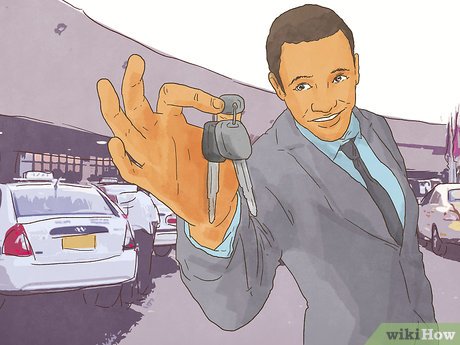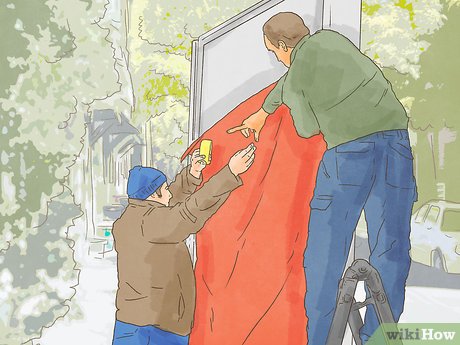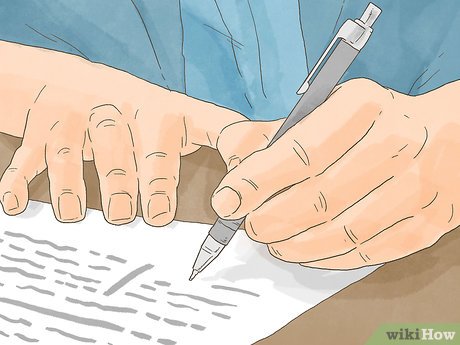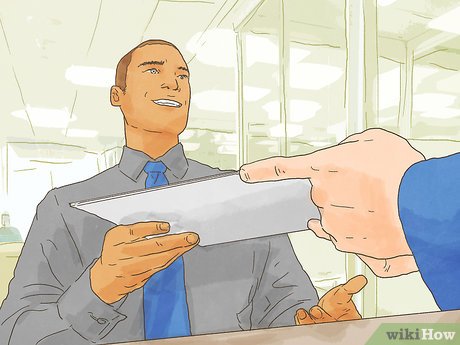How to Get a Used Car Dealers License
Part 1 of 3:
Taking Initial Steps to Be Ready to Apply
-
 Decide what type of license you need. In many states, the application process and the license you obtain may vary based on the kind of vehicle that you wish to sell. Some options that you may have to consider cover a wide range:[1][2]
Decide what type of license you need. In many states, the application process and the license you obtain may vary based on the kind of vehicle that you wish to sell. Some options that you may have to consider cover a wide range:[1][2]- New or used
- Cars
- Motorcycles
- Boats
- Trailers
- Motor homes
- Wholesale (as opposed to individual retail sales)
- Emergency vehicles
-
 Study your state's application process. The application process alone for obtaining a car dealer's license is extensive.[3] Some states, such as Texas or California for example, publish a car dealer manual that explains the business of car sales, as well as the application process. Find out from your state's Department of Motor Vehicles if such a guide is available, and then take the time to study it.
Study your state's application process. The application process alone for obtaining a car dealer's license is extensive.[3] Some states, such as Texas or California for example, publish a car dealer manual that explains the business of car sales, as well as the application process. Find out from your state's Department of Motor Vehicles if such a guide is available, and then take the time to study it. -
 Prepare your establishment. In many states, as part of your application, you must already have an established business location. For example, in Washington, you are required to have an enclosed building, with a fixed, permanent, exterior sign, a phone number listed in directory assistance, and minimum business hours for at least five days a week.[4] New Jersey adds particular requirements that you must be able to demonstrate that you have a desk, chair, landline telephone, and a safe for storing documents.[5] Indiana sets requirements on the square footage space that you need for displaying vehicles.[6] You will need to research the minimum requirements for your state so that your location is ready when you apply.
Prepare your establishment. In many states, as part of your application, you must already have an established business location. For example, in Washington, you are required to have an enclosed building, with a fixed, permanent, exterior sign, a phone number listed in directory assistance, and minimum business hours for at least five days a week.[4] New Jersey adds particular requirements that you must be able to demonstrate that you have a desk, chair, landline telephone, and a safe for storing documents.[5] Indiana sets requirements on the square footage space that you need for displaying vehicles.[6] You will need to research the minimum requirements for your state so that your location is ready when you apply. -
 Prepare the paperwork. In addition to the application form itself, most states have a variety of other forms that you must submit. Check your state's Department of Motor Vehicle web site for the complete requirements. Some examples of the additional work you must prepare include:
Prepare the paperwork. In addition to the application form itself, most states have a variety of other forms that you must submit. Check your state's Department of Motor Vehicle web site for the complete requirements. Some examples of the additional work you must prepare include:- Zoning Approval Form (Maryland[7])
- Sales Tax Certificate of Authority (New Jersey[8])
- Corporate filings from the Secretary of State, if applicable to the business (Ohio[9])
- Child Support Certification Form (New York[10])
- These are just examples. Check with your state for specific information.
-
 Take care of insurance and bonding. In most states, in order to operate as a car dealer and obtain a license, you must show that you are adequately insured. The insurance is to protect the business from loss related to the inventory, and also to protect individuals from accident while they are on your property. Each state sets its own limits and requirements for insurance amounts.[11]
Take care of insurance and bonding. In most states, in order to operate as a car dealer and obtain a license, you must show that you are adequately insured. The insurance is to protect the business from loss related to the inventory, and also to protect individuals from accident while they are on your property. Each state sets its own limits and requirements for insurance amounts.[11] -
 Prepare the necessary fees. Each state has its own system of fees that go along with submitting and obtaining a dealer's license. In some cases, such as New York, the fee is a set amount.[12] In other states, like Ohio for example,[13] the fee may vary depending on the size of the business you intend to operate.
Prepare the necessary fees. Each state has its own system of fees that go along with submitting and obtaining a dealer's license. In some cases, such as New York, the fee is a set amount.[12] In other states, like Ohio for example,[13] the fee may vary depending on the size of the business you intend to operate. -
 Obtain the necessary background check. In many cases, along with your application, you will have to submit a criminal background records check. In some states, this will include fingerprinting and reference checks. These processes can take some time, so begin working on this well before you wish to submit your application.[14]
Obtain the necessary background check. In many cases, along with your application, you will have to submit a criminal background records check. In some states, this will include fingerprinting and reference checks. These processes can take some time, so begin working on this well before you wish to submit your application.[14]
Part 2 of 3:
Applying for a Car Dealer's License
-
 Complete the application form and all other required paperwork. When you believe you are ready, with all the preparations, get the license application form from your state's Department of Motor Vehicles and complete it carefully. In many cases, a single form will be used for multiple types of licenses, so read and complete the form carefully.
Complete the application form and all other required paperwork. When you believe you are ready, with all the preparations, get the license application form from your state's Department of Motor Vehicles and complete it carefully. In many cases, a single form will be used for multiple types of licenses, so read and complete the form carefully.- A useful reference site is DMV.org. Although this site is not connected officially to any state's department of motor vehicles, DMV.org does have links to most of the official forms from all 50 states.[15]
-
 Submit your application and other materials. If you have planned ahead, this may just mean collecting the paperwork that you have been working on and delivering it to the Department of Motor Vehicles. In some states, you may even be able to submit your application and upload additional paperwork via computer.
Submit your application and other materials. If you have planned ahead, this may just mean collecting the paperwork that you have been working on and delivering it to the Department of Motor Vehicles. In some states, you may even be able to submit your application and upload additional paperwork via computer.- It is a good idea to contact your DMV ahead of time to find out if they accept, or even require, that you make a personal appointment.
-
 Cooperate and participate in the review process. Once you submit your application and the accompanying materials, your application will be assigned to a licensing agent for review. That person will look through your entire package for completeness and accuracy. There may even be a site inspection to your business location. It is in your best interest to cooperate with this process to assure that it goes smoothly. Keep in mind that it can take several weeks to complete the application process before your license is issued.[16]
Cooperate and participate in the review process. Once you submit your application and the accompanying materials, your application will be assigned to a licensing agent for review. That person will look through your entire package for completeness and accuracy. There may even be a site inspection to your business location. It is in your best interest to cooperate with this process to assure that it goes smoothly. Keep in mind that it can take several weeks to complete the application process before your license is issued.[16]
Part 3 of 3:
Maintaining Your Dealer's License
-
 Renew your license as required. You will need to make sure that your license is current at all times. This will usually require a renewal application (much simpler than the original process) and payment of a renewal fee. For example, Florida allows you to pay a $75 fee and renew each year, or opt for a two-year license and pay a $150 fee. Connecticut allows you to renew online, using a credit card to pay the fee.[17]
Renew your license as required. You will need to make sure that your license is current at all times. This will usually require a renewal application (much simpler than the original process) and payment of a renewal fee. For example, Florida allows you to pay a $75 fee and renew each year, or opt for a two-year license and pay a $150 fee. Connecticut allows you to renew online, using a credit card to pay the fee.[17] -
 Attend to all reporting requirements on a timely basis. As an ongoing business, you will now have a variety of reports to submit, including sales reports, tax returns, and others. If you fail to keep up with the reporting requirements, you could lose your dealer's license. Check with the Department of Motor Vehicles as well as the Secretary of State's Office to keep up with your local requirements.
Attend to all reporting requirements on a timely basis. As an ongoing business, you will now have a variety of reports to submit, including sales reports, tax returns, and others. If you fail to keep up with the reporting requirements, you could lose your dealer's license. Check with the Department of Motor Vehicles as well as the Secretary of State's Office to keep up with your local requirements. -
 Avoid violations. It is important that you continue to comply with your state's expectations in operating your business or you could lose your license at any time. For example, the New Jersey Motor Vehicle Commission publishes a list of violations that could lead to suspension or revocation.[18] Some of the things to avoid are selling from additional non-licensed locations, failing to maintain records, failing to report accurate sales and tax information, and misuse of dealer plates.
Avoid violations. It is important that you continue to comply with your state's expectations in operating your business or you could lose your license at any time. For example, the New Jersey Motor Vehicle Commission publishes a list of violations that could lead to suspension or revocation.[18] Some of the things to avoid are selling from additional non-licensed locations, failing to maintain records, failing to report accurate sales and tax information, and misuse of dealer plates.
Share by
Lesley Montoya
Update 24 March 2020












